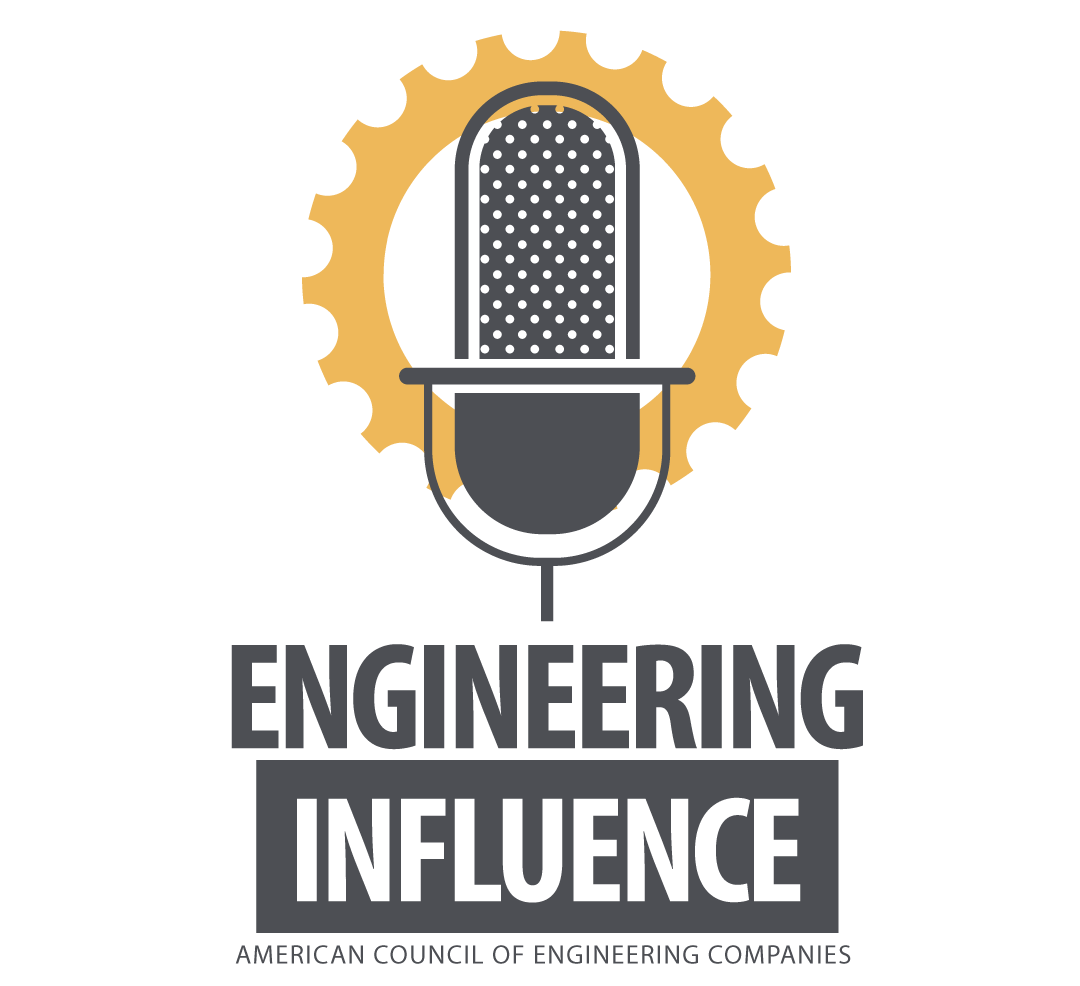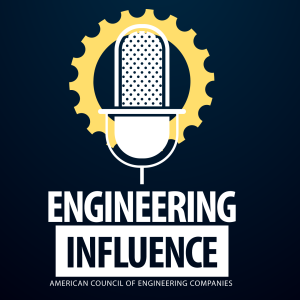
The Voice of the Business of Engineering
Engineering Influence is the official award-winning podcast of the American Council of Engineering Companies (ACEC).
ACEC is the trade association representing America's engineering firms; the businesses that design our built environment. Subscribe to the podcast for a variety of content ranging from interviews with newsmakers and elected officials to in-depth conversations on business trends, the economy, technology and what's next for the engineering and design services industry.
Visit us online at www.acec.org
Follow us on Twitter at @ACEC_National
ACEC reserves the right to moderate episodes on its channel and make editorial decisions on the inclusion or deletion of comments posted by listeners. Direct any questions to comms@acec.org.
Episodes

Tuesday Oct 01, 2024
Building Tomorrow: ACEC Minnesota's Vision for Engineering Education
Tuesday Oct 01, 2024
Tuesday Oct 01, 2024
Welcome to Engineering Influence, a podcast by the American Council of Engineering Companies. In this episode, we delve into the creation and mission of the Engineering Education Foundation of America (EEFA), founded by ACEC Minnesota. John Curry, Executive Director of ACEC Minnesota, and Dan Larson, past treasurer of ACEC and CEO of AET, discuss the foundation's goals and its impact on workforce development and education.
John shares the driving forces behind EEFA, emphasizing the need to address workforce shortages and partner with educational organizations. The foundation focuses on four main initiatives: STEM education, post-secondary programs, industry retention and mentorship, and data-driven decision-making.
Dan Larsen explains his motivation for supporting EEFA, highlighting its role in fostering a future engineering workforce. He discusses the long-term vision and the importance of collaboration among various stakeholders to make engineering an exciting career choice for young people.
Tune in to learn more about EEFA's achievements, including the successful launch of a 501c3 organization, scholarship programs, and volunteer-driven initiatives. Discover how ACEC Minnesota's efforts aim to inspire the next generation of engineers and strengthen the consulting engineering industry.

Wednesday Sep 25, 2024
Unlocking Digital Transformation in Engineering: Insights from Arup’s Chief Data Officer
Wednesday Sep 25, 2024
Wednesday Sep 25, 2024
Welcome to another exciting episode of the Engineering Influence podcast from ACEC. Join our host, Thomas Grogan, Senior Director of Economics and Market Intelligence, as he sits down with Tembi Hommes, Global Chief Data Officer from Arup, to dive deep into the realm of digital transformation.
In this episode, Tembi shares her unique perspective on what digital transformation means beyond just technology. She emphasizes the importance of optimizing processes, ensuring data integrity, and setting up robust security measures. Learn how the AEC engineering industry can benefit from adopting standardized data language and achieving interoperability across systems.
Discover practical advice for smaller firms looking to embark on their digital transformation journey, and understand the critical role of training and change management in successful implementation. Tembi also discusses the potential of emerging technologies like GenAI and their transformative impact on engineering and design.
Whether you're a large firm or a small business, this episode offers invaluable insights into leveraging data and technology to drive innovation and achieve strategic business outcomes. Don’t miss out on this informative discussion!

Thursday Sep 19, 2024
From Engineer to CEO: Joe Sczurko’s Journey at WSP
Thursday Sep 19, 2024
Thursday Sep 19, 2024
In this episode, Jeff Urbanchuk, Senior Vice President of Communications and Marketing at ACEC National, sits down with Joe Sczurko, U.S. Region President of WSP.
Joe shares his career path from starting as a field engineer to leading one of the largest engineering firms in the United States. Joe discusses the importance of understanding clients, projects, and people, and how his diverse experiences in different sectors have shaped his leadership approach. The conversation also delves into WSP's strategic vision, focusing on resilience, innovation, and the evolving role of technology in the engineering industry.
Learn about the significant acquisitions by WSP, including the recent addition of Power Engineers, and how these moves are positioning the firm for future growth. Joe also highlights the critical need for attracting and retaining talent, and the importance of early engagement with potential future engineers. Tune in to discover how WSP is navigating the challenges and opportunities in today's engineering landscape and what the future holds for this dynamic industry.

Tuesday Sep 17, 2024
Unleashing the Future of AEC: A Deep Dive into Digital Transformation
Tuesday Sep 17, 2024
Tuesday Sep 17, 2024
Welcome to the Engineering Influence podcast from ACEC. In this episode, Thomas Grogan, Senior Director of Economics and Market Intelligence at ACEC, sits down with Jason Miller, Head of Innovation at Ramble, to explore the profound impact of digital transformation in the AEC industry.
Jason shares insights on how Ramble is leveraging digital tools to enhance data usage, streamline processes, and create greater value for clients. He emphasizes the importance of upskilling employees and fostering a culture that embraces change and innovation.
Discover the day-to-day challenges and opportunities faced by the Head of Innovation at Ramble and learn how the firm is navigating the complexities of technology integration, including AI and large language models. Jason also discusses strategies for smaller firms to adopt a data-driven approach and the significance of maintaining flexibility in a rapidly evolving tech landscape.
Tune in to gain valuable advice on starting a digital transformation journey, avoiding common pitfalls, and unlocking the potential of your team with the latest digital advancements. This episode is packed with practical tips and inspiring perspectives that can help any firm, big or small, thrive in the digital age.

Monday Sep 16, 2024
Monday Sep 16, 2024
Welcome to the Engineering Influence podcast from ACEC, hosted by Thomas Grogan, Senior Director, Economics and Market Intelligence. In this episode, we are delighted to have Chelsey Hendrickson from Kimley Horn, who leads the New Ventures Incubator and Technology Solutions team.
Chelsey dives into the meaning of digital transformation and its impact on improving work experiences, client outcomes, and community services. She shares insights into her dynamic role, highlighting the importance of collaboration, market research, and continuous innovation to address evolving challenges.
Throughout the conversation, Chelsey discusses the importance of leveraging employee passions and expertise, the need for market-tested solutions, and the critical role of change management. She also offers valuable advice for smaller firms looking to embark on their digital transformation journey incrementally.
The episode concludes on an optimistic note, emphasizing the energizing effect of technology on employees and the potential for an even greater impact on the communities served by the engineering industry.
Join us to explore the transformative potential of technology in engineering and gain actionable insights from an industry leader.

Monday Sep 09, 2024
Driving Digital Transformation in the AEC Industry with Jason Miller
Monday Sep 09, 2024
Monday Sep 09, 2024
Welcome to the Engineering Influence podcast from ACEC. In this episode, Thomas Grogan, Senior Director of Economics and Market Intelligence at ACEC, sits down with Jason Miller, Head of Innovation at Ramboll, to discuss the pivotal role of digital transformation in the AEC industry.
Jason shares insights on what digital transformation means for Ramboll, emphasizing the importance of foundational technologies, data reuse, and upskilling colleagues to prepare for the future of the AEC industry. He also talks about the creation of the Ramboll Tech organization aimed at accelerating change and innovation within the company.
The conversation delves into the challenges and opportunities of digital transformation, including the importance of flexibility, the potential of data strategies, and the need to balance innovation with risk management. Jason also highlights the significance of maintaining a client-centric approach and the benefits of fostering a culture that embraces failure and learning.
As the discussion wraps up, Jason offers valuable advice for smaller firms looking to embark on their own digital transformation journey and shares his optimistic view on the future, driven by the energy and potential of new digital tools to solve sustainability challenges in the AEC industry.
Join us for this engaging episode to learn more about how digital transformation is shaping the future of engineering and consulting.

Thursday Sep 05, 2024
Thursday Sep 05, 2024
The Intersection of Digital Transformation and the AEC Industry: Insights from Stantec's CTOWelcome to the Engineering Influence Podcast from ACEC. In this episode, Thomas Grogan, Senior Director of Economics and Market Intelligence at ACEC, engages in an insightful discussion with Shankar Kalyana, Chief Technology Officer at Stantec.Shankar shares his expertise on the nuanced differences between digitization and digital transformation, emphasizing the importance of reimagining processes rather than merely automating inefficient ones. He highlights the critical role of active C-suite sponsorship and robust change management in driving successful transformation initiatives.The conversation also delves into best practices and lessons learned from other sectors, the importance of aligning technology strategy with business objectives, and the collaborative effort required to upskill and modernize the workforce. Shankar offers valuable advice for smaller firms on navigating digital transformation and identifies key technologies poised to impact the industry.Join us for a comprehensive exploration of how digital transformation can unlock new value and drive innovation within the AEC industry.

Wednesday Sep 04, 2024
Navigating Digital Transformation with HDR's CTO
Wednesday Sep 04, 2024
Wednesday Sep 04, 2024
Welcome to the Engineering Influence podcast from ACEC, hosted by Thomas Grogan, Senior Director of Economics and Market Intelligence at ACEC. In this episode, we are thrilled to have Justin Webster, Chief Technology Officer at HDR, share his insights on digital transformation.
Justin dives into what digital transformation means to him and how he applies modern technologies to elevate HDR's operations. He discusses the importance of aligning technology with business strategies, overcoming challenges, and making data-driven decisions. Justin also shares valuable lessons from his experience in various industries and provides advice for smaller firms on developing a technology strategy.
Listen in to learn about the risks and opportunities in digital transformation and how to effectively leverage technology to stay ahead in the industry.





